
The SDGs Academy at the Africa Children Summit

The inaugural Africa Children Summit was not just an ‘attend and go’ summit. It was a platform for children and partnering organization to showcase their work, creativity, and solutions towards creating a better world for children.
With the budding SDGs Academy for Children, Arigatou International could ill-afford to miss this opportunity to promote it’s through the SDGs Academy for Children.
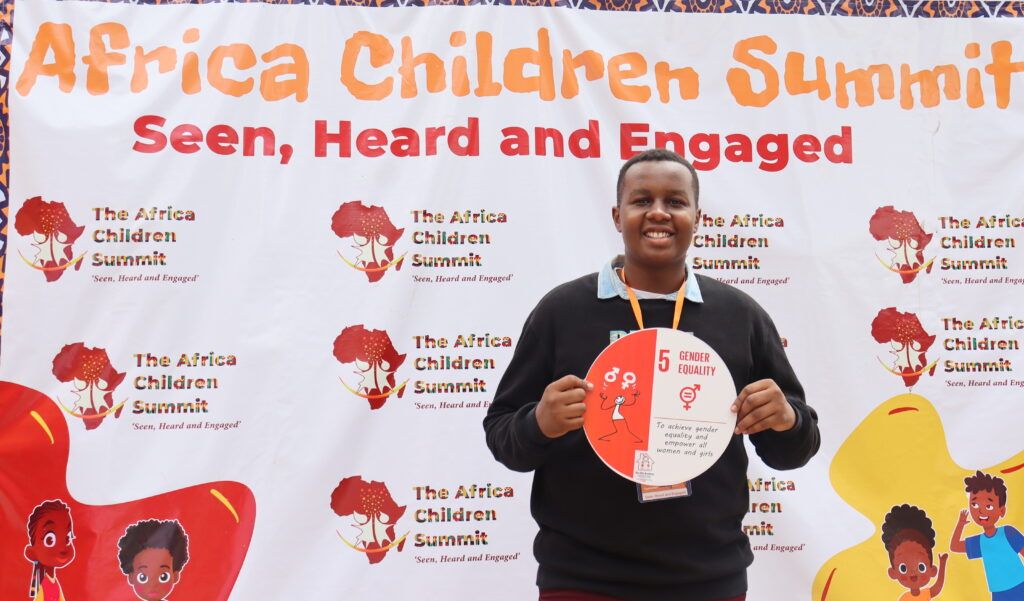
At the summit, we established a child-friendly innovations hub, which took a miniature form of the physical hub of the Academy, complete with the 5 hubs (Knowledge, Dialogue, Capacity, Faith and Fun, Innovations and Solutions) equipped with informative materials corresponding to the hubs.
The innovation hub served not only to portray how a physical space of the Academy looks like but also took participants (both children and adults) through an overview of Arigatou International and what it does with a specific focus on the SDGs Academy for Children.
In droves as well as in their numbers, children as well as adults frequented the innovations space as they were moved by the amazing story and model of the Academy and the breathtaking set up of the space. Further, the array of SDGs related informative materials as well as fun and media related resources pulled participants to the space, with most of them visibly posing for photos with their favorite SDGs, designed as posters.
“It’s very important that as children we start working on the SDGs as soon as possible because they are actually meant for a better future for children. The SDGs should actually be part of our curriculum” Brian, Child, Kenya.
The innovation space further served as hosting space for breakout sessions during the summit, one of which was one media and technology. Children in the session called for the need to have their parents, caregivers and teachers enlightened more on media and technology with regards to best ways to keep children safe on online spaces as well as support them meaningfully use such spaces to learn.
Aside from the innovation hub, we set up a booth through which participants got a first-hand brief about the SDGs Academy for Children among other key areas of Arigatou International.
As we accelerate efforts in promoting the Academy and cementing its footprints and imprints, the Africa Children Summit provided a huge platform towards entrenching the Academy as one of the available meaningful children participation spaces; with the Academy focused on providing a safe space and programme for children’s participation, learning and action on the Sustainable Development Goals (SDGs), and the Agenda 2030 in general.
Arigatou International was one of the 23 partnering organizations for the Africa Children Summit and presented the SDGs Academy for Children as a safe space for children to participate in coming up with solutions to create a better world around them.
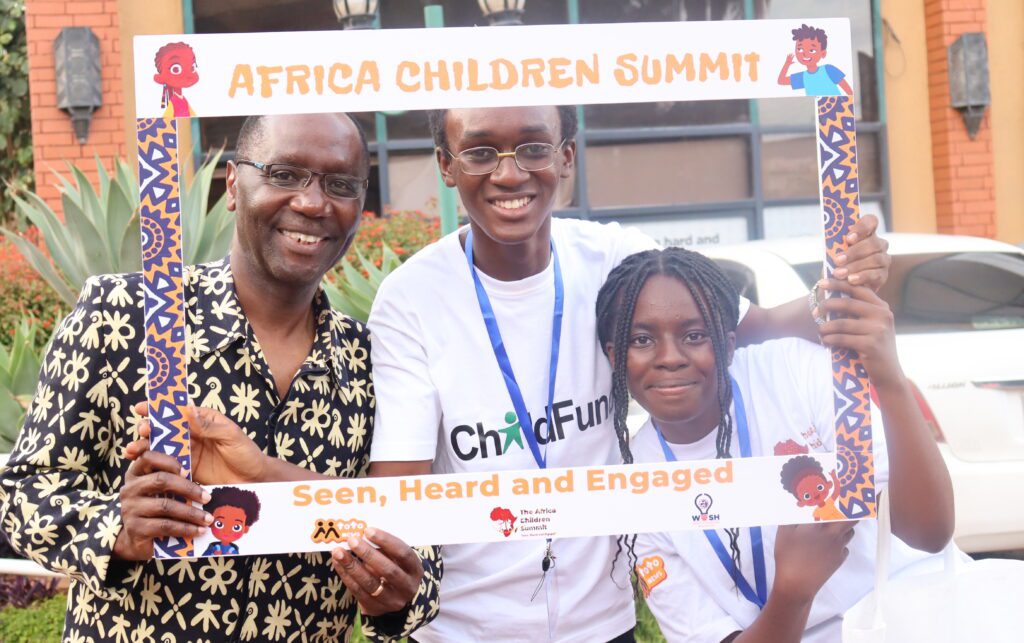
“We at Arigatou International are excited to see the outcomes of this summit, and the impact that your ideas and actions will have on Africa and the world, and we are committed to support your efforts in any way we can – especially though our Arigatou SDGs Academy for Children” expressed Fred Nyabera, Director, Arigatou International – End Child Poverty.
The post The SDGs Academy at the Africa Children Summit appeared first on End Child Poverty.
The post The SDGs Academy at the Africa Children Summit appeared first on Arigatou International.

A Space Designed by Children, for Children to be Seen, Heard, and Engaged
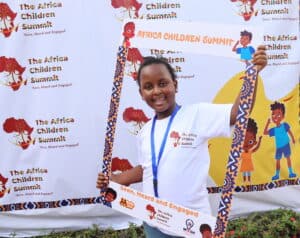
Have you ever attended a forum, session, workshop, or conversation where children are in charge? Chances are, you have not experienced this often or even at all. The inaugural Africa Children Summit, which took place in Nairobi, Kenya from 10th – 12th April, was such unique space entirely designed for and by children to be “Seen, Heard and Engaged”.
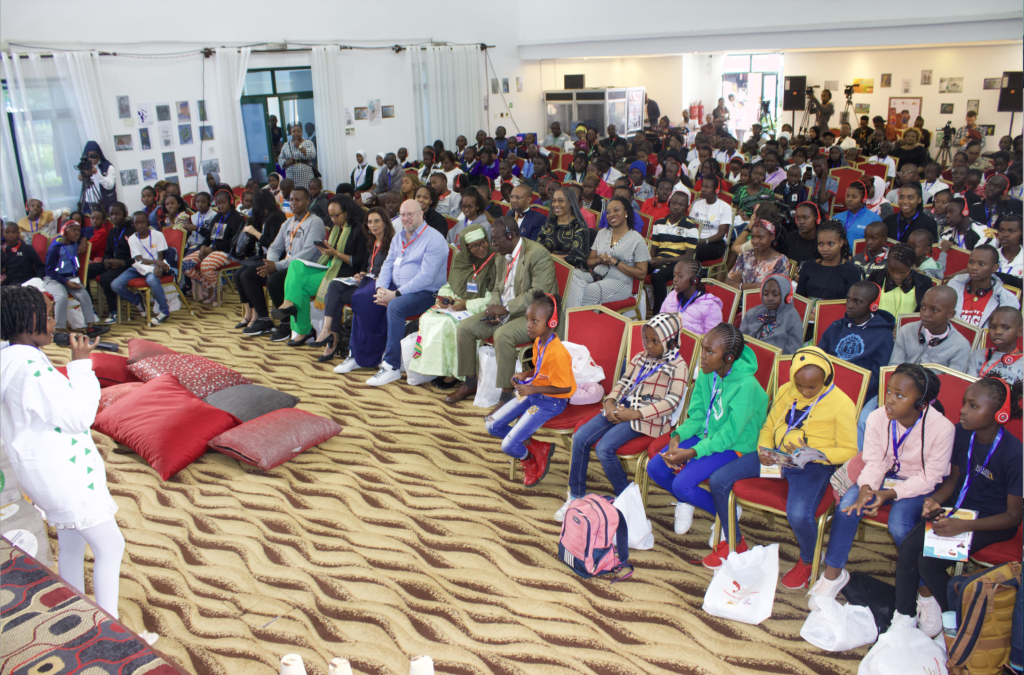
The summit was conceptualized, planned and facilitated by children from across Africa, culminating in a 3-day event that brought together over 250 in-person participants from 9 countries (Mali, Kenya, Rwanda, Sierra Leone, South Africa, Tanzania, Uganda, Zambia and Zimbabwe), and up to 700 virtual participants from a host of countries across Africa and beyond.
“If it is indeed our day then we should participate in organizing it, determining the theme, and working with adults to ensure it is genuinely our day!” expressed Omar, a 17-year-old from Kenya.
Children discussed pertinent matters concerning them, such as education, climate change, violence against children, online child protection, and health, with policy makers and parents/caregivers. They called on governments and other stakeholders to provide sufficient funding and facilities for schools, with special attention to physically challenged children, and emphasized the need to have education available, acceptable, adaptable and equal across Africa.
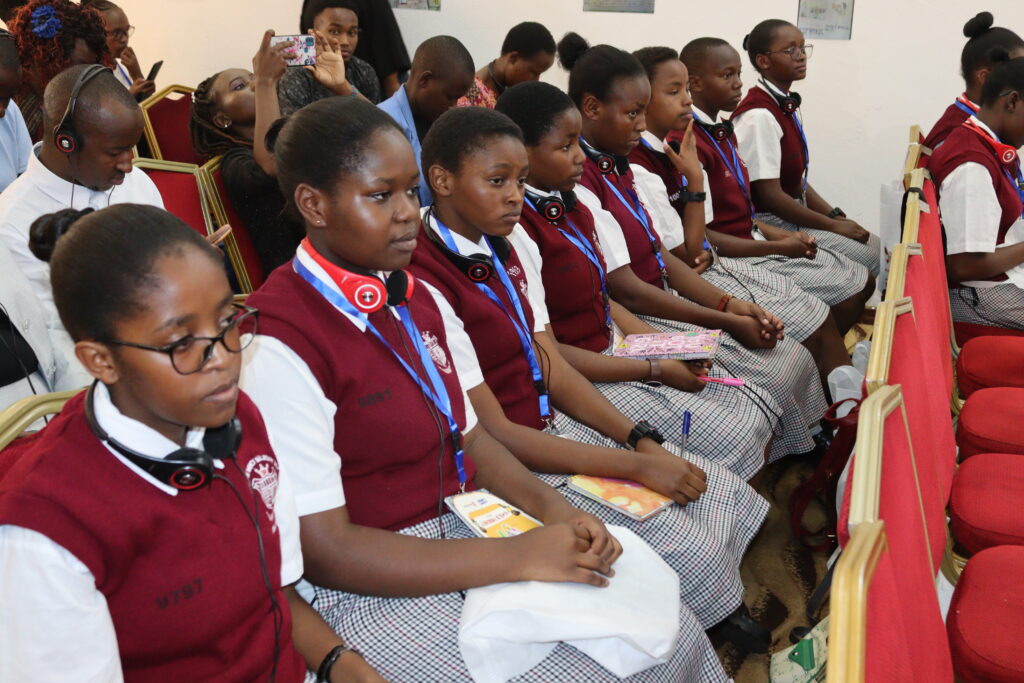
“We need to have gender equality when providing education to all children” expressed Francine, a 16-year-old from Zambia.
Margarate, a child from South Africa, emphasized the need for safe online spaces for children to learn and interact. This echoes the call made by others who advocate for policies and measures to protect children online, rather than discouraging them from using or engaging with online platforms. These advocates point to the essential role that online spaces played in facilitating virtual learning during the COVID-19 pandemic lockdown period, and urge society to prioritize the creation of safe online environments for children.
During a side event focused on ending violence against children, Dr. Najat Maalla, the United Nations Special Representative on Violence Against Children, discussed the issue with attendees. At the event, children expressed their regret that violence against them is still prevalent, even in what should be safe spaces such as homes and schools.
Upendo, a child from Kenya, highlighted that emotional violence can be just as damaging as physical violence and stressed the need for emotional and psychological care.
Dr. Najat contributed to the discussion by revealing that violence against children was a widespread issue that involves harmful cultural practices still present in Africa. She emphasized the need for a comprehensive approach to addressing this problem, one that involves empowering and involving children, communities, religious and traditional leaders in advocating for change and monitoring the actions of governments.
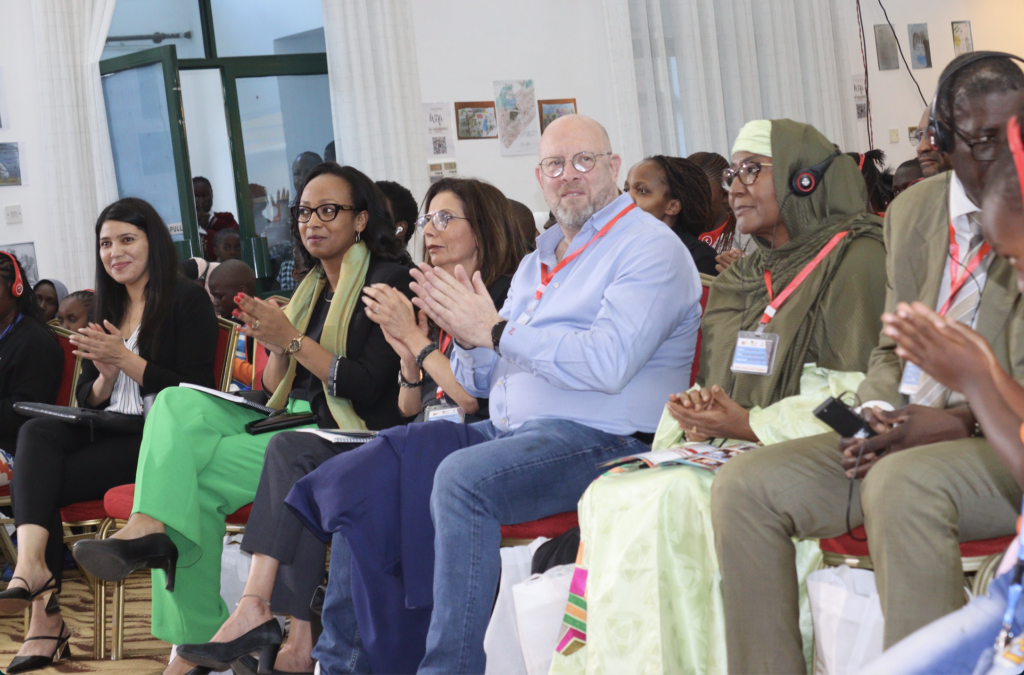
Contributing to this subject was Dr. Mustafa Y. Ali; Secretary General of Arigatou International’s Global Network of Religions for Children (GNRC) who shared that Arigatou International uses religion as a resource to focus on the challenges and practices that undermine, and promote the rights of children.
The children highlighted that violence among them was still rampant, even in what are supposed to be safe spaces for them like homes and schools. They stressed the need for emotional and psychological care, and for policies and measures to be put in place to address violence against children broadly.
Arigatou International was one of the 23 partnering organizations for the Africa Children Summit and presented the SDGs Academy for Children as a safe space for children to participate in coming up with solutions to create a better world around them.
“We at Arigatou International are excited to see the outcomes of this summit, and the impact that your ideas and actions will have on Africa and the world, and we are committed to support your efforts in any way we can – especially though our Arigatou SDGs Academy for Children” expressed Fred Nyabera, Director, Arigatou International – End Child Poverty. The summit concluded with children handing over a position paper with recommendations to policy makers and government officials. The recommendations highlighted key action areas on the thematic areas discussed by children in the summit.
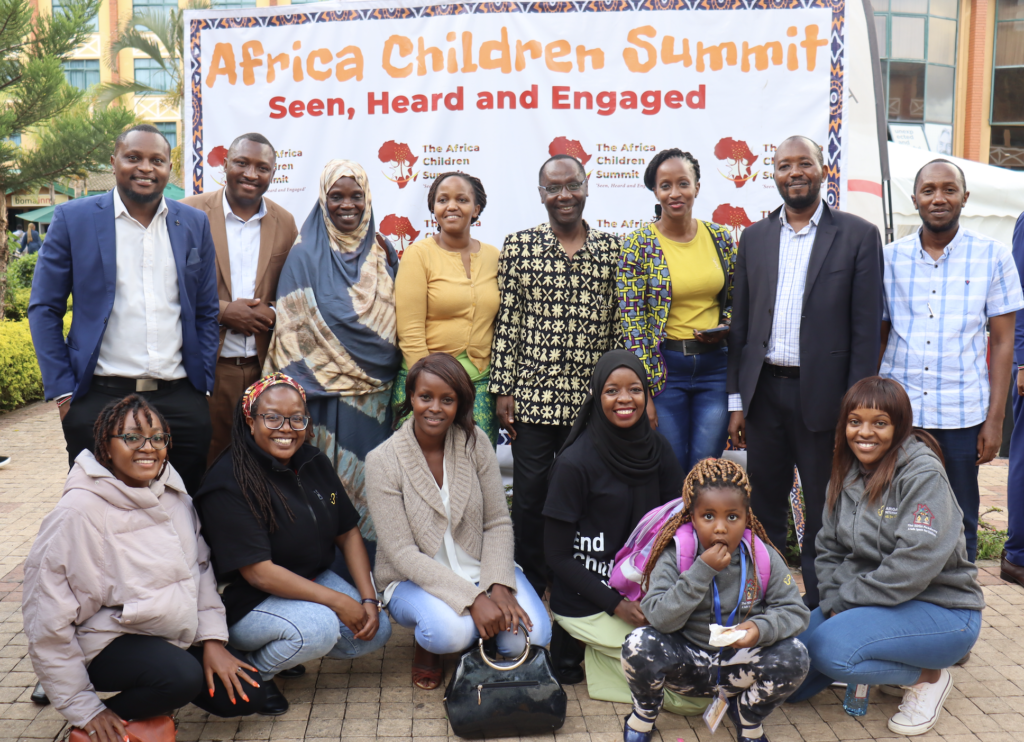
The post A Space Designed by Children, for Children to be Seen, Heard, and Engaged appeared first on End Child Poverty.
The post A Space Designed by Children, for Children to be Seen, Heard, and Engaged appeared first on Arigatou International.

A Space Designed by Children, for Children to be Seen, Heard, and Engaged

Have you ever attended a forum, session, workshop, or conversation where children are in charge? Chances are, you have not experienced this often or even at all. The inaugural Africa Children Summit, which took place in Nairobi, Kenya from 10th – 12th April, was such unique space entirely designed for and by children to be “Seen, Heard and Engaged”.

The summit was conceptualized, planned and facilitated by children from across Africa, culminating in a 3-day event that brought together over 250 in-person participants from 9 countries (Mali, Kenya, Rwanda, Sierra Leone, South Africa, Tanzania, Uganda, Zambia and Zimbabwe), and up to 700 virtual participants from a host of countries across Africa and beyond.
“If it is indeed our day then we should participate in organizing it, determining the theme, and working with adults to ensure it is genuinely our day!” expressed Omar, a 17-year-old from Kenya.
Children discussed pertinent matters concerning them, such as education, climate change, violence against children, online child protection, and health, with policy makers and parents/caregivers. They called on governments and other stakeholders to provide sufficient funding and facilities for schools, with special attention to physically challenged children, and emphasized the need to have education available, acceptable, adaptable and equal across Africa.

“We need to have gender equality when providing education to all children” expressed Francine, a 16-year-old from Zambia.
Margarate, a child from South Africa, emphasized the need for safe online spaces for children to learn and interact. This echoes the call made by others who advocate for policies and measures to protect children online, rather than discouraging them from using or engaging with online platforms. These advocates point to the essential role that online spaces played in facilitating virtual learning during the COVID-19 pandemic lockdown period, and urge society to prioritize the creation of safe online environments for children.
During a side event focused on ending violence against children, Dr. Najat Maalla, the United Nations Special Representative on Violence Against Children, discussed the issue with attendees. At the event, children expressed their regret that violence against them is still prevalent, even in what should be safe spaces such as homes and schools.
Upendo, a child from Kenya, highlighted that emotional violence can be just as damaging as physical violence and stressed the need for emotional and psychological care.
Dr. Najat contributed to the discussion by revealing that violence against children was a widespread issue that involves harmful cultural practices still present in Africa. She emphasized the need for a comprehensive approach to addressing this problem, one that involves empowering and involving children, communities, religious and traditional leaders in advocating for change and monitoring the actions of governments.

Contributing to this subject was Dr. Mustafa Y. Ali; Secretary General of Arigatou International’s Global Network of Religions for Children (GNRC) who shared that Arigatou International uses religion as a resource to focus on the challenges and practices that undermine, and promote the rights of children.
The children highlighted that violence among them was still rampant, even in what are supposed to be safe spaces for them like homes and schools. They stressed the need for emotional and psychological care, and for policies and measures to be put in place to address violence against children broadly.
Arigatou International was one of the 23 partnering organizations for the Africa Children Summit and presented the SDGs Academy for Children as a safe space for children to participate in coming up with solutions to create a better world around them.
“We at Arigatou International are excited to see the outcomes of this summit, and the impact that your ideas and actions will have on Africa and the world, and we are committed to support your efforts in any way we can – especially though our Arigatou SDGs Academy for Children” expressed Fred Nyabera, Director, Arigatou International – End Child Poverty. The summit concluded with children handing over a position paper with recommendations to policy makers and government officials. The recommendations highlighted key action areas on the thematic areas discussed by children in the summit.

The post A Space Designed by Children, for Children to be Seen, Heard, and Engaged appeared first on End Child Poverty.
The post A Space Designed by Children, for Children to be Seen, Heard, and Engaged appeared first on Arigatou International.

What Is a Team Sport?
Team sport is an activity in which a group of people work together towards a common goal. There are many different types of team sports, with each one requiring different skills and equipment.
Some of the most popular team sports include football, basketball, hockey, lacrosse, and soccer. They are a great way to meet new people and get some exercise!
These sports also allow children to learn a variety of important life skills, such as communication, fair play and responsibility. In addition, they can develop their artistic streaks and become more confident.
The pedagogical benefits of group sports are endless, and they will help children build strong social bonds that can last a lifetime. These soft skills can help them overcome social and behavioral problems, and they will also assist them in forming a sense of community.
Leadership is another important skill that can be learned from team sports. It requires individuals to lead their teammates toward a common goal or objective, and it also involves giving and receiving feedback. This type of communication is essential for future success in the workplace, and it can also be a great way to foster positive relationships with others.
Time management is a very important aspect of team sports, especially for those who are involved in multiple games throughout the week. They must be able to juggle a lot of activities, including practice, games and school or work during the day.
Team sports require patience, persistence and hard work. They also teach you to accept setbacks and learn from them.
This can be a valuable lesson in life, as it helps to prevent people from becoming complacent and unmotivated. It can also teach kids to be resilient, and encourage them to keep trying until they reach their goals.
Learning to communicate effectively is a key component of a successful team, and it can be difficult to develop these skills in a classroom setting. In team sports, players must work together to make sure they are on the same page, and it can be a challenge for those who are shy or have trouble communicating in other ways.
They will need to be able to listen and react to what their teammates have to say, as well as be willing to offer their own input in order to get the best possible results for the team. In the future, they will be able to use these skills in many other aspects of their lives.
Being a part of a team is an excellent way to learn the importance of putting winning in the proper perspective. When teammates share the burden of a loss, it can be lessened and made easier to deal with. This can also be an excellent way to learn how to handle adversity and hardships, as well as how to appreciate the contributions of other members of the team.
The post What Is a Team Sport? appeared first on www.snvla.org.

The Importance of Business Services

Business services are a type of intangible goods or service that a business provides to another company or organization. They are a common business model and represent a large industry.
The Business services industry includes a variety of different types of business activities that are provided to companies (business-to-business, or B2B). Some of these services include accounting and consulting, facility management, marketing and staffing.
Many business services are offered through online platforms and systems or mobile apps. These are becoming increasingly common as businesses seek a more convenient way to provide their services.
Whether the services are a small part of an overall business process or a full-scale project, business service providers have the expertise to help businesses solve complex problems.
They are usually contracted for a set amount of time, but they may be hired on an ongoing basis to provide support or maintain equipment. They offer a wide range of expertise, and often come with specialized training.
Business services can also be a way for companies to increase the efficiency of their operations and improve customer service levels. Outsourcing certain tasks can help businesses focus on their core business and allow them to free up time to perform other activities that are important for their success.
The importance of business services can’t be overstated, and they are essential for the economic wellbeing of our society. Without them, our economy wouldn’t have the capacity to grow and evolve in a meaningful manner.
There are three main kinds of business services: social, business-to-business, and personal. Each kind of business service has its own characteristics, and a company’s choice of which one to use can have a significant impact on its growth.
Business-to-business, or B2B, services typically offer a fixed rate for a specific set of work or a flat rate for all work. These are typically used by businesses that need extra help, or want to lower their costs or generate more output.
This category of business services is a subset of the professional services sector and is a growing area of the economy. This industry is projected to expand by more than 20% between now and 2025, according to the US Bureau of Labor Statistics.
The business services sector is a critical component of our economy, and the jobs it generates are highly skilled. The skills required to be successful in a business services job include creativity, communication, and problem-solving.
A career in this field is ideal for those who enjoy helping others and collaborating with other professionals to achieve their goals. Some careers in this sector are highly lucrative, and there are a wide range of opportunities for those who have the right skill sets.
The services sector is growing rapidly as technology and digitalization continue to transform the way people do business. This has led to an influx of startups and new innovations in the market. This is a positive trend for the sector, as it opens up new opportunities and challenges to business service providers across the globe.
The post The Importance of Business Services appeared first on www.snvla.org.






